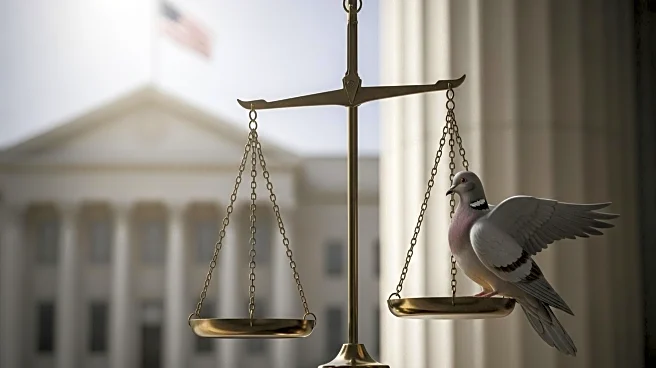What is the story about?
What's Happening?
A federal judge has issued a restraining order against federal agents, specifically targeting their use of tear gas and projectiles during interactions with media and protesters in Chicago. U.S. District Judge Sara Ellis ruled that these actions violated constitutional rights, particularly the First Amendment, which guarantees freedom of speech and assembly. The order prohibits federal agents from using force against peaceful protesters, clergy, or journalists unless there is an immediate threat of physical harm. This ruling follows a lawsuit filed by the Chicago Headline Club and other media organizations against Homeland Security Secretary Kristi Noem and federal agencies, alleging excessive force and brutality by federal agents during immigration-related protests.
Why It's Important?
This ruling is significant as it underscores the protection of First Amendment rights amidst heightened tensions surrounding immigration enforcement. It sets a precedent for how federal agents should conduct themselves during protests, particularly in safeguarding the rights of journalists and peaceful demonstrators. The decision may influence similar cases across the U.S., potentially leading to more stringent oversight of federal law enforcement actions during public demonstrations. The ruling also highlights ongoing conflicts between federal agencies and civil rights groups, emphasizing the need for accountability and transparency in law enforcement practices.
What's Next?
The restraining order applies only to the northern district of Illinois, but it may prompt similar legal actions in other jurisdictions. Federal agencies might need to reassess their crowd control strategies to comply with constitutional standards. The Department of Justice has expressed concerns about the order's practicality, suggesting potential challenges in its implementation. Meanwhile, media organizations and civil rights groups may continue to monitor and report on federal agents' conduct, potentially leading to further legal challenges if violations occur.
Beyond the Headlines
The ruling could have broader implications for civil liberties, particularly in how government agencies balance law enforcement with constitutional rights. It may also influence public perception of federal agencies, potentially affecting trust and cooperation between communities and law enforcement. The case highlights the ongoing debate over the use of force in public protests, raising questions about ethical standards and the role of media in documenting and challenging government actions.















